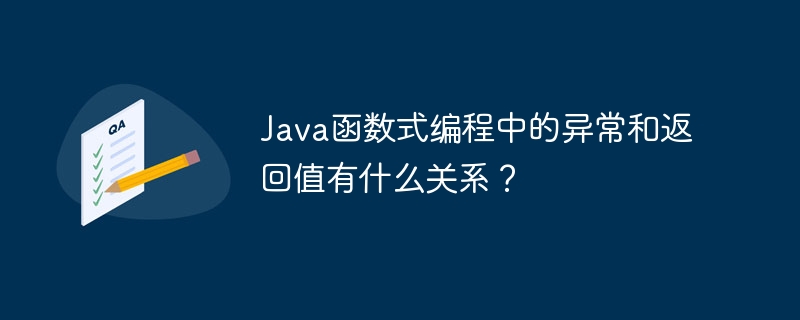
Java函数式编程中的异常和返回值
在Java函数式编程中,异常和返回值有着紧密的关系。函数式编程倡导使用纯函数,即不产生副作用、不修改输入状态的函数。然而,在实际应用中,难免会遇到需要处理异常的情况。
返回值类型
在Java中,函数式接口可以返回两种类型的值:
立即学习“Java免费学习笔记(深入)”;
异常处理
在函数式编程中,异常处理通常通过两种方式实现:
throws子句来处理checked exceptions。RuntimeException。实战案例
考虑以下 Java 函数式接口:
@FunctionalInterface
interface Operation<T> {
T apply(T input) throws Exception;
}使用 lambda 表达式实现该接口:
Operation<Integer>multiply = (x) -> x * 2;
处理Checked Exception
如果函数可能会抛出 checked exception,必须在函数签名中声明throws子句。例如:
Operation<String>parseInt = (s) -> {
try {
return Integer.parseInt(s);
} catch (NumberFormatException e) {
throw new RuntimeException(e);
}
};调用时,必须使用try-catch块处理 checked exception:
try {
int result = parseInt.apply("123");
} catch (RuntimeException e) {
// 处理 NumberFormatException
}忽略Unchecked Exception
对于 unchecked exception,可以不处理或声明抛出。例如:
Operation<Integer>divide = (x) -> {
return x / 0; // 可能抛出 ArithmeticException
};调用时,可以选择忽略 unchecked exception:
try {
int result = divide.apply(10);
} catch (Exception e) {
// 不做处理
}最佳实践
在函数式编程中,最佳实践是尽量使用 pure 函数。对于需要处理异常的情况,建议使用 checked exception并明确通过try-catch块处理异常。尽量避免使用 unchecked exception,因为它可能导致意外的程序行为。
以上就是Java函数式编程中的异常和返回值有什么关系?的详细内容,更多请关注php中文网其它相关文章!

每个人都需要一台速度更快、更稳定的 PC。随着时间的推移,垃圾文件、旧注册表数据和不必要的后台进程会占用资源并降低性能。幸运的是,许多工具可以让 Windows 保持平稳运行。

Copyright 2014-2025 https://www.php.cn/ All Rights Reserved | php.cn | 湘ICP备2023035733号